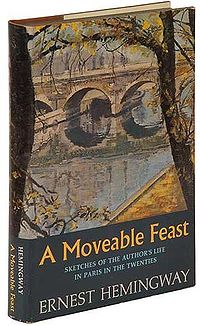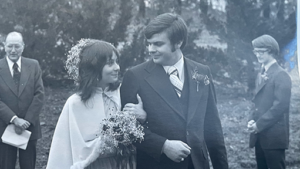 “If you are lucky enough to have lived in Paris as a young man then wherever you go for the rest of your life it stays with you, for Paris is a moveable feast.” This statement made by Ernest Hemingway to a friend became the inspiration for the title of a book which is in itself a moveable feast, a book which will carry you into the past, to Paris long ago. A Moveable Feast is Ernest Hemingway’s memoir of his life in that beautiful city in the 1920s. Hemingway lived and worked there when he was very young and very much in love with his wife, Hadley. He worked as a journalist for a while, but then he took the leap, quit his job and began to write full time. He loved Paris, and considered it to be the best place in the world to write.
“If you are lucky enough to have lived in Paris as a young man then wherever you go for the rest of your life it stays with you, for Paris is a moveable feast.” This statement made by Ernest Hemingway to a friend became the inspiration for the title of a book which is in itself a moveable feast, a book which will carry you into the past, to Paris long ago. A Moveable Feast is Ernest Hemingway’s memoir of his life in that beautiful city in the 1920s. Hemingway lived and worked there when he was very young and very much in love with his wife, Hadley. He worked as a journalist for a while, but then he took the leap, quit his job and began to write full time. He loved Paris, and considered it to be the best place in the world to write.
The book is a collection of some of his most vivid memories. He writes about Gertrude Stein who held a salon in her apartment for young artists. Many familiar names take on life when you read about Hemingway’s acquaintance with James Joyce, his aversion to Ford Madox Ford, his great friendship with Ezra Pound, and his tender compassion for the tragic Scott Fitzgerald.
The writing is typical Hemingway, tight, concise, never an extraneous word. It is sometimes funny and lighthearted, sometimes grave and sad. Some of his most poignant writing describes his turbulent relationship with Fitzgerald: “If he could write a book as fine as The Great Gatsby I was sure he could write an even better one. I did not know Zelda yet, and so I did not know the terrible odds that were against him. But we were to find out soon enough.”
I first read A Moveable Feast in the late sixties. I was captivated by the picture that Hemingway created. There was Paris, home to painters and poets, musicians and writers of stories. There were the gardens and the cafes, the wine, and too much drinking of it. Recently I was prompted to pick this book up again and discovered the Restored Edition. There are differences of opinion about the two editions, but in the newer one much of the heavy posthumous editing has been removed. Making use of the author’s original manuscripts, the editors have been able to give new life to Hemingway’s story.
Knowing what we know now about Ernest Hemingway’s life and death, it is sad to read his memories of his early years when he was often happy and his life held so much promise. But it is really a fascinating portrait of a lost time and place, and it is a pleasure to read. According to his son, Patrick Hemingway, the last words that the author ever wrote as a professional writer are “the true foreword to A Moveable Feast”: “This book contains material from the remises of my memory and of my heart. Even if the one has been tampered with and the other does not exist.”




